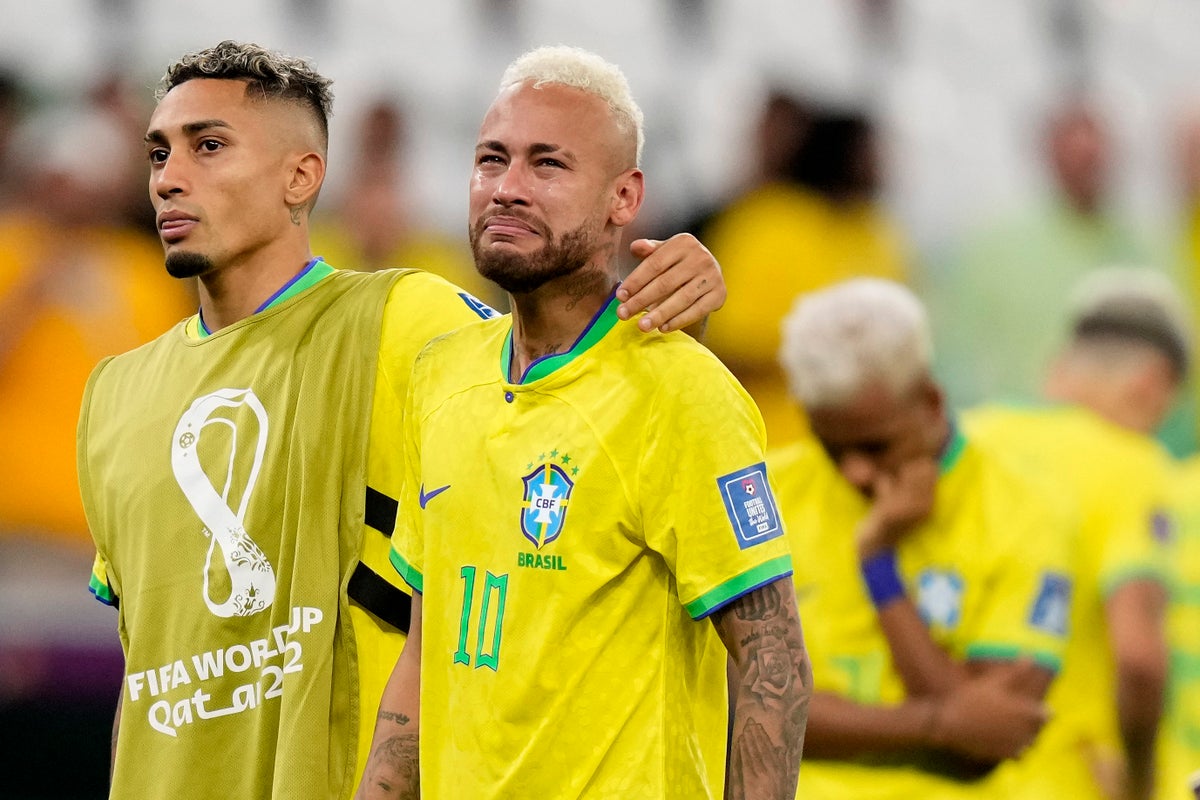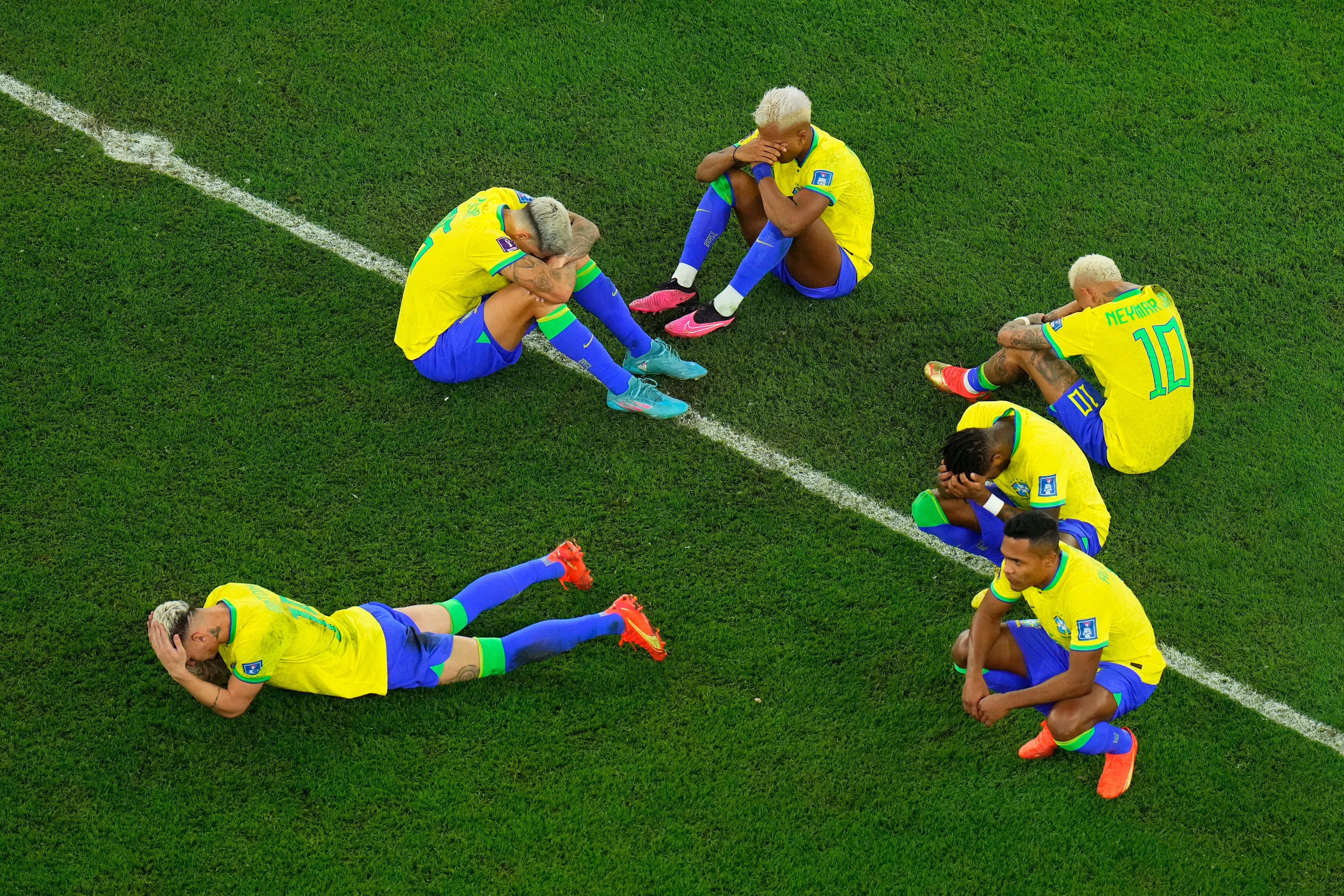
The way Tite phrased it, it was a deviation. He rued the deflection off Marquinhos that brought an equaliser for Bruno Petkovic and a penalty shootout where Marquinhos missed the final kick. In the bigger picture, it was a deviation, too: from their supposed destiny.
Instead of the hexa, the longed-for sixth World Cup, they got the hex of the quarter-final, the hex of meeting European sides at the business end of tournaments. On the night Neymar found parity with Pele on Brazil’s all-time scoring chart, he came ever closer to being permanently separated from his country’s greatest legend: one will forever be described as a World Cup winner, the other is increasingly unlikely to belong in the same category. In due course, Neymar will stand alone in the scoring charts but those Brazilians who did not lift the World Cup, even those as great as Zico, can feel second-class citizens compared to the members of the five teams who did.
After the joy for Neymar of his 77th goal came the tears of his third World Cup exit. He has still not played in a semi-final, let alone a final. After all the focus on their dance routines, perhaps Brazil were guilty of premature celebration, of assuming a lead would bring a place in the last four.
The margins were narrow: four minutes from victory, the inside of the post Marquinhos struck in the shootout. A count of 11 shots on target to a solitary, deflected one mattered not. Brazil had failed, the top-ranked team in the world going out to a country of 4 million people.
For Tite, it was “the end of a cycle”, almost certainly the conclusion to his six-year reign. For Thiago Silva and Dani Alves, who will be in their 40s before the next World Cup, it must be the end of an era. It may be the end for Casemiro, who is considering his international future. Neymar could be back in 2026, but will probably be diminished as a footballer by then. The Ballon d’Or he craves may next go to Lionel Messi or Kylian Mbappe, but not the third member of the Paris Saint-Germain forward line.
Brazil showed form between World Cups but that is less important than form in it and they rarely looked the best team in Qatar. They could rue the brilliance of Dominik Livakovic, the Croatian goalkeeper, who made 10 saves even before stopping Rodrygo’s penalty. They could regret the goal they conceded: when Fred was brought on to partner Casemiro, it seemed an attempt to close the game down, but they were caught on the counter-attack. They could lament a profligacy that has become a recurring theme this tournament; after two goals from 23 shots against Serbia, one from the defensive midfielder Casemiro from 13 attempts v Switzerland and none from 21 against Cameroon came a costly display of wastefulness. The four-goal first-half salvo against South Korea was the exception: apart from that Brazil scored four goals in Doha.
Against Croatia, they could rue Tite’s changes. Zlatko Dalic, with the lesser strength in depth of a country with a third of the population of Sao Paulo, nonetheless found two substitutes, in Mislav Orsic and Petkovic, who could combine for a goal, and successfully altered formation.
Meanwhile Brazil, once again, feel strangely incomplete, unable to channel their huge talent pool into an all-conquering team. Perhaps Tite should have taken Roberto Firmino, because Gabriel Jesus’s injury left him lacking a compelling back-up to Richarlison; then again, the fact a Tottenham substitute is Brazil’s first-choice striker, albeit one with three goals in the World Cup, means they are less blessed than in some previous generations, even if this is not the striking nadir of Fred and Jo in 2014.
Certainly, they had problem positions. Brazil produces footballers and exports them in record numbers but even a country of 200 million is not producing certain types of players. One is a surprise: the presence of Danilo and Eder Militao on the pitch and Roberto Carlos and Cafu in the stands highlighted how a great tradition of attacking full-backs may be ending. Alves is 39 and seemed at the World Cup as much for his personality as his current skills as a player. The injured Alex Sandro might have made a difference on the left, but Brazil lacked attacking thrust on either flank.
The other area was illustrated by the magician and the metronome, in Luka Modric. The ball belongs at his feet in a way it does not with any Brazilian midfielder; Casemiro was arguably their player of the tournament, but as a defensive presence. Lucas Paqueta was a No 10 shifted into a deeper role. Tite scarcely seemed to trust Bruno Guimaraes and perhaps his successor should. But there was no playmaker; it is a long-standing deficiency, arguably affecting every time after the celebrated midfield of Socrates, Cerezo, Falcao and Zico broke up.

Another great Brazilian quartet were in the executive boxes. Ronaldo, Rivaldo, Roberto Carlos and Cafu, the most distinguished fan club in world football, departed disappointed. The class of 2002 will remain Brazil’s last World Cup winners until at least 2026, when Cafu will be 56.
Their successors have felt burdened by pressure; perhaps it meant a penalty shootout would always favour Croatia. “I think we need to be ready to share our joy and also willing to share our sadness and I think there is a new generation of players that will find strength in adversity,” said Tite, philosophically.
Yet the recent tradition is to find trauma in defeat. In 2018, Tite was outwitted by Roberto Martinez and Brazil were outclassed by Belgium. In 2014, they were humiliated by Germany. This, in contrast, seemed a game they should have won. Notoriety does not beckon for his team as it did for the failures of 2014; nor, however, will they be as fondly remembered as the doomed heroes of 1982, often deemed the best side never to win the World Cup. Instead, they were a group who could have won it but didn’t. And, increasingly, that feels the way for Brazil. A quarter-final exit is not a deviation, but the norm.







